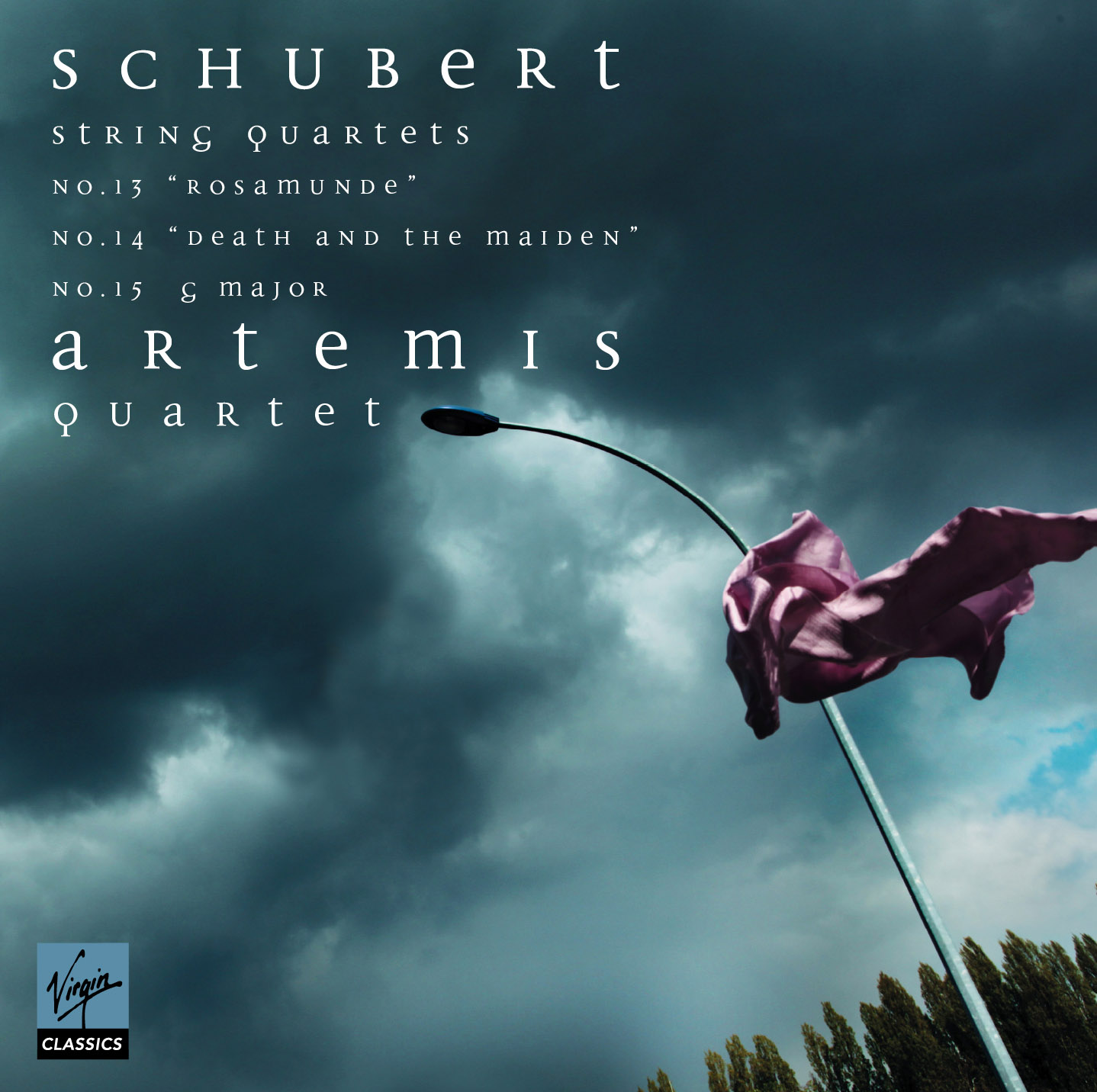
Schubert String Quartets Rosamunde Death and the Maiden Quartet in G major
Release Date: 04/06/2012
CD 1
String Quartet in D minor D810 "Death and the Maiden"
I. Allegro
II. Andante con moto
III. Scherzo. Allegro molto
IV. Presto
String Quartet in A minor/a-moll/en la mineur, D804 "Rosamunde"
I. Allegro ma non troppo
II. Andante
III. Minuetto. Allegretto
IV. Allegro moderato
CD 2
String Quartet in G major/G-dur/en sol majeur, D887
I. Allegro molto moderato
II. Andante un poco mosso
III. Scherzo. Allegro vivace
IV. Allegro assai
Following the Artemis Quartet‘s prizewinning Beethoven Quartet cycle on Virgin Classics, the Berlin-based ensemble has recorded Schubert’s last three quartets, works that Artemis cellist Eckart Runge praises for both their “incredible simplicity and purity” and their “almost terrifying modernism”.
Awarded both Germany‘s prestigious Klassik ECHO award and France’s Grand Prix de l’Académie Charles Cros in 2011 for their Virgin Classics Beethoven cycle, the members of the Artemis Quartet now release an all-Schubert CD. It presents the composer’s final three string quartets: No 13 in A minor, ‘Rosamunde’ (which draws on his incidental music for Helmina von Chezy’s play Rosamunde); No 14 in D minor, ‘Death and the Maiden’ (with its haunting second movement based on his song Der Tod und das Mädchen), and No 15 in G major.
Schubert and Beethoven were contemporaries in Vienna, and Beethoven is reputed to have returned some of the younger composer’s admiration, but, as Eckart Runge, cellist of the Artemis Quartet points out: “In some senses, Beethoven and Schubert could hardly be more different.” He goes on to say that “The Artemis Quartet’s intensive experience of performing and recording the Beethoven cycle between 2009 and 2011 has provided new perspectives on every other quartet we play. There is an almost terrifying modernism in these three late Schubert quartets, but it is totally different from the modernism of Beethoven. And, when placed together in a programme, the three quartets shine in another light: No 14 is concentrated and dramatic; No 15 is huge, symphonic, and cosmic, and No 13 is introspective and melancholy – less spectacular than the other two.
“Schubert has an incredible simplicity, while Beethoven’s quartets are more elaborately structured,” he continues. “The genius of Schubert’s simplicity comes from the lied – fundamentally, Schubert thinks in terms of a singing melody over a bassline and a harmonic accompaniment. That approach is rarely found in Beethoven’s quartets, which are packed with themes, counter-themes, motifs and structural elements. Schubert’s writing holds its own challenges: his purity, his focus on a single idea, means that the music is reduced to the essence of expression. You would expect that simple conception to presuppose a short form, but he succeeds in creating lengthy works … The G major quartet lasts 50 minutes!”
Runge feels that the simplicity of these late quartets – although Schubert wrote them around the age of just 30, he was already fatally ill and was to die at 33 – is quite radical. “They do feel like late works. How can a man write this music at that age? It’s a cliché, but you can hear the proximity to death in his music. Schubert had a very concentrated life and was astonishingly prolific. By contrast, Beethoven wrote his late quartets when he was in his fifties.” Schubert attended Beethoven’s funeral in spring 1827 and just 18 months later he too was dead.
This new Schubert album joins the Artemis Quartet’s 2008 release of the composer’s String Quintet (for which cellist Truls Mørk complemented the ensemble) and Quartettsatz in C minor. In the UK, The Telegraph greeted the recording of the Quintet as “certainly among the most probing in the catalogue”, praising the players for keeping “romantic expressiveness, dramatic urgency and a classical sense of architecture in fine equilibrium”. A New York Times concert review evokes the discoveries that await listeners to the new CD: “Even Schubert's '’Death and the Maiden’, one of the most frequently performed quartets, bristled with fresh life in the Artemis performance. Seemingly small details often made the difference, as in the second movement when the Artemis played extended portions without vibrato, bringing a striking austerity to an otherwise lush theme … [This was] daring, edge-of-the-seat playing … [characterised by] visceral energy and rich four-part imagination.”
back



